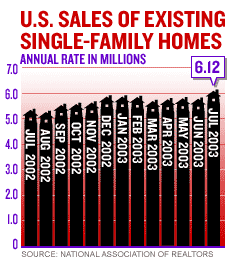NEW YORK (CNN/Money) -
Sales of existing homes jumped to a record in July, a real estate group said Monday, as rising mortgage rates apparently spurred some indecisive potential buyers to jump into the market before rates get too high.

A report from the National Association of Realtors (NAR) showed homes sold at an annual rate of 6.12 million in the month, up 5 percent from June's pace of 5.83 million.
On average, economists surveyed by Reuters had expected sales of existing homes -- which make up about 85 percent of the total U.S. housing market, with brand-new homes comprising the other 15 percent -- to rise to a 5.94 million rate in July.
July's pace of home sales was the fastest on record, beating the 5.94-million-unit pace set in January 2003 and December 2002.
The NAR pointed out that mortgage rates also rose in July, citing a report from mortgage security firm Freddie Mac that the national average commitment rate for a 30-year, conventional, fixed-rate mortgage was 5.63 percent in July, up from a record low 5.23 percent in June.
In August, rates have risen even higher; last week, the latest data available, they averaged 6.24 percent, according to Freddie Mac.
"When mortgage interest rates first began to rise from record lows, it appears some buyers jumped into the market to take advantage of good affordability conditions before interest rates moved even higher," said David Lereah, NAR's chief economist.
But it's difficult to get a read on exactly how much this "fence jumping" might have influenced the pace of sales, Lereah added.
U.S. stock prices continued to fall after the report, while Treasury bond prices fell.
Driven by the lowest interest rates in more than 40 years, the housing market has been one of the few bright spots in an economy that's struggled to show consistent growth after the 2001 recession.
Low rates fueled a mortgage refinancing boom, which helped homeowners cut their monthly bills, supporting consumer spending, which makes up more than two-thirds of the economy. And higher home values have helped homeowners feel wealthier, easing the sting of a long bear market in stocks.
| 
| |

| 
| 
|

|
 Mortgage applications fell last week to the lowest level in more than a year but economists say there's life yet in the nation's housing market. CNNfn's Kathleen Hays reports. Mortgage applications fell last week to the lowest level in more than a year but economists say there's life yet in the nation's housing market. CNNfn's Kathleen Hays reports.
|
 Play video
Play video
(Real or Windows Media)
|
| 
|

|
|
The NAR said the national median existing-home price was $182,100 in July, up 12.1 percent from July 2002, when the median price was $162,400 -- the strongest national price jump since November 1980.
The NAR also said the gain in prices was due to the combination of high demand and tight inventories, but some economists worry the national housing market is in a dangerous "bubble," similar to the technology-stock bubble of the late 1990s.
Most economists dismiss this idea, however, pointing to low inventories, which should support prices even if demand slacks off, and the fact that home selling takes a long time to process, unlike stock sales, which happen more quickly and can be more volatile.
On the other hand, the national housing market is really the sum of many regional markets.
| Related stories
|

|
|
|
|
And some of those -- such as Riverside-San Bernardino, Calif., Providence, R.I., and Los Angeles -- saw prices jump more than 20 percent in the second quarter alone, according to another NAR report earlier this month, giving them more of a "bubble-like" appearance than other regional markets.
Whether the jump in mortgage rates will cause trouble in such markets remains to be seen. In the meantime, the continuing strength of housing likely will continue to support consumer spending and the broader economy in the short term.
"This [recent jump in home sales] won't last past the fall ... but for now the rise in prices and surge in activity will contribute to both increased confidence and spending," said Ian Shepherdson, chief U.S. economist at High Frequency Economics Ltd.

|

